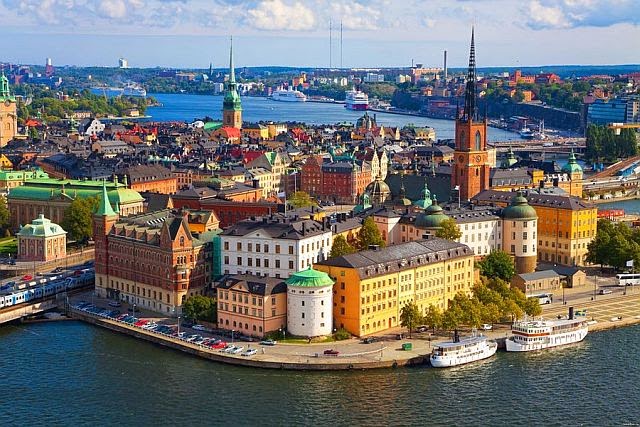 |
| Golden fields of rape surround a traditional red and white Swedish cottage (wikipedia) |
 |
| Sweden is a country of lake with a stunning archipelago (wikipedia) |
For thousands of years the country was covered with glaciers, resulting
in more than 100,000 lakes. The result is a wonderland of beauty, chiseled by
time and perfected by the craftsmanship of Mother Nature herself.
The earliest settlers appeared in the third century BC. At Vitlycke,
rock carvings date to the Bronze Age, while huge stone grave-markers in the
area serve as reminders of man’s presence centuries ago.
 |
| Ancient rock carvings at Vitlycke date to the Bronze Age (wikipedia) |
The best remains can be seen on the long, narrow island of Oland
 |
| Prehistoric fort at Eketorp on the island of Oland (wikipedia) |
At Eketorp, one of 15 prehistoric forts on Oland ,
visitors can tour an Iron Age reconstruction of a fortified village as it existed
1,500 years ago. Eketorp thrived from 400 AD through the age of the Vikings
until the middle of the 13th century.
Until the early 19th century, Sweden Europe . The first groups of emigrants sailed to the New World in 1638, and from 1840 to 1920, more than a million
Swedes left the country.
So large was the exodus that the Emigrant Institute in Vaxjo was
established to tell the story of the migration. Today, the House of the
Emigrants attracts genealogists and historians from all over the world to study
Swedish ancestry.
Here visitors can follow the footsteps of the emigrants along the
meandering back country route the Swedes traveled hundreds of years ago.
Today, Sweden
 |
| Cruising the Gota Canal between Stockholm and Gothenburg (wikipedia) |
Between the cities of Kalmar and Vaxjo
lies the Kingdom
of Crystal
 |
| Eternal daylight of the midnight sun in Sweden (wikipedia) |
In summer, another glow in northern Sweden
Few destinations offer a greater selection of diverse, quality museums
than Sweden Stockholm alone has more than 65 such
attractions, including the Wasa
Museum
 |
| The warship Wasa was raised from the Stockholm harbor and preserved almost 90% intact (wikipedia) |
Known as “Sweden
 |
| The stunning harbor with its collection of historic ships in Gothenburg (wikipedia) |
The Milles
Outdoor Sculpture
Museum
 |
| Quaint narrow streets of Gamla Stan in Stockholm (wikipedia) |
In Malmo
Gothenburg boasts a Maritime
Center
Visitors with extra time may want to experience a cruise along the
idyllic environmental treasure of the Gota Canal which connects Stockholm
 |
| Stockholm is built on 14 islands and features the best of the old with the best of the new (wikipedia) |
Most Swedes speak some degree of English and will happily try to speak
it with visitors.
 |
| Watching boats on the Gota Canal is a favorite pastime in Sweden (wikipedia) |
Ask any Swede what is best about their country and each will express in
a personal way their love for its forests, woodlands, streams and archipelagos.
For travelers, the nature of the land is important but so, too, is the nature
of the people.
As English writer Juliette Levy once said, “Every land has its own
special rhythm, and unless the traveler takes time to learn the rhythm, he or
she will remain an outsider there always.”
 |
| It may look like a church but it is actually the fish market in Gothenburg (wikipedia) |
Truly Sweden
You see, it’s not so bad to lose yourself in Sweden







0 comments:
Post a Comment